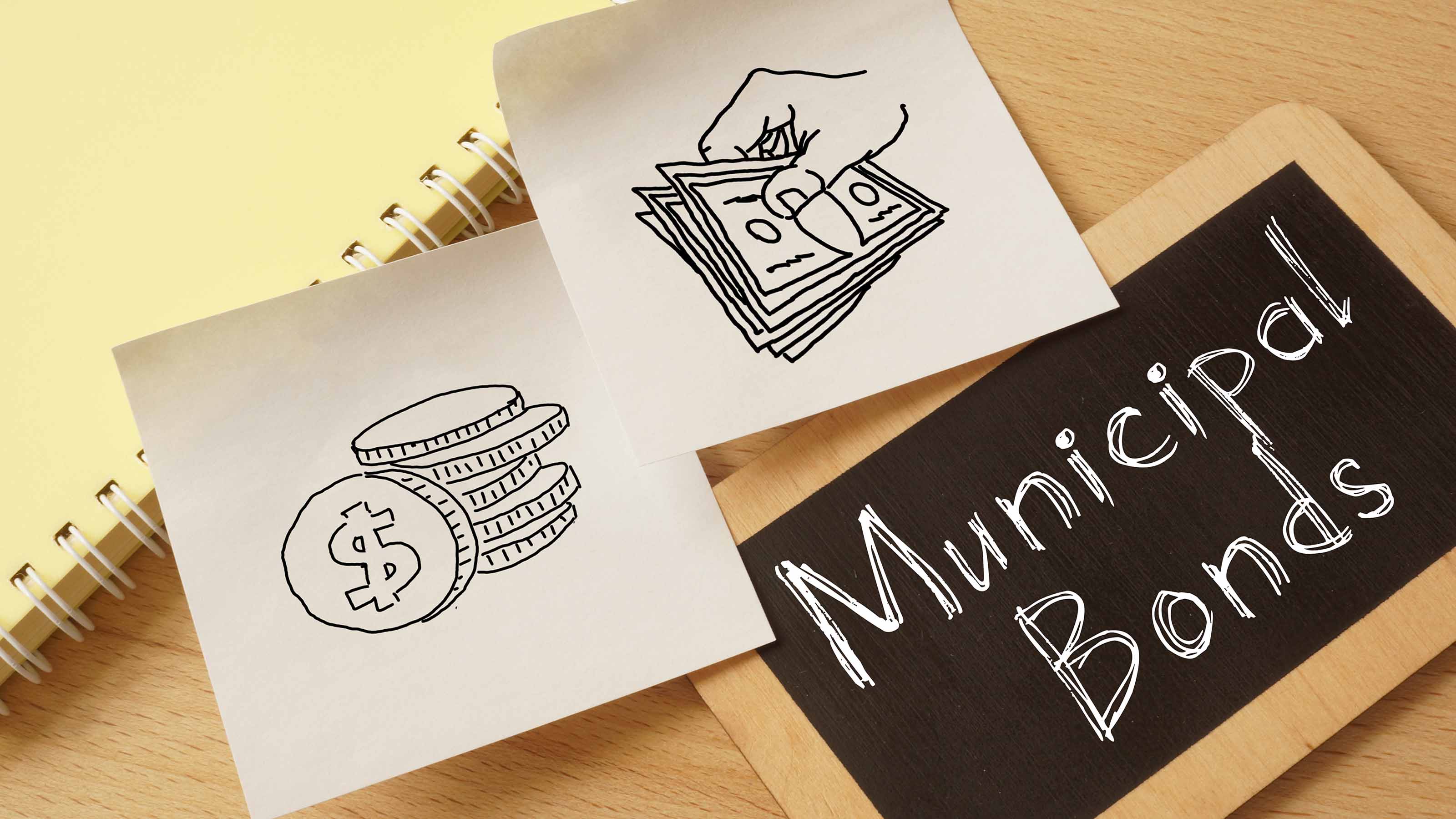Municipal Bonds Stand Firm
If you have the cash to invest, municipal bonds are a worthy alternative to CDs or Treasuries – even as they stare down credit-market Armageddon.


Profit and prosper with the best of Kiplinger's advice on investing, taxes, retirement, personal finance and much more. Delivered daily. Enter your email in the box and click Sign Me Up.
You are now subscribed
Your newsletter sign-up was successful
Want to add more newsletters?

Delivered daily
Kiplinger Today
Profit and prosper with the best of Kiplinger's advice on investing, taxes, retirement, personal finance and much more delivered daily. Smart money moves start here.

Sent five days a week
Kiplinger A Step Ahead
Get practical help to make better financial decisions in your everyday life, from spending to savings on top deals.

Delivered daily
Kiplinger Closing Bell
Get today's biggest financial and investing headlines delivered to your inbox every day the U.S. stock market is open.

Sent twice a week
Kiplinger Adviser Intel
Financial pros across the country share best practices and fresh tactics to preserve and grow your wealth.

Delivered weekly
Kiplinger Tax Tips
Trim your federal and state tax bills with practical tax-planning and tax-cutting strategies.

Sent twice a week
Kiplinger Retirement Tips
Your twice-a-week guide to planning and enjoying a financially secure and richly rewarding retirement

Sent bimonthly.
Kiplinger Adviser Angle
Insights for advisers, wealth managers and other financial professionals.

Sent twice a week
Kiplinger Investing Weekly
Your twice-a-week roundup of promising stocks, funds, companies and industries you should consider, ones you should avoid, and why.

Sent weekly for six weeks
Kiplinger Invest for Retirement
Your step-by-step six-part series on how to invest for retirement, from devising a successful strategy to exactly which investments to choose.
A week before the powers that be in the nation's capital mercifully managed not to default on Treasury debt, one of my favorite tax-exempt bond managers, Eve Lando, of Thornburg Funds, said to "run, not walk" to municipal bonds.
She noted that state and local bonds had moved little in price and yield all spring, despite the prospect that the federal government might suffer a "technical" default – meaning a day or two of weirdness and trading losses before Congress would belatedly raise the debt limit and agree to make all U.S. bond investors whole.
Because municipal borrowers rely on enormous direct federal grants or in-direct federal support (such as the presence of Treasury bonds in escrow to buttress the munis' timely repayment of principal), the tax-exempt world should have come under heavy pressure. And yet it stood firm. If municipals can stare down credit-market Armageddon, well, what's a little mild recession talk?
From just $107.88 $24.99 for Kiplinger Personal Finance
Become a smarter, better informed investor. Subscribe from just $107.88 $24.99, plus get up to 4 Special Issues

Sign up for Kiplinger’s Free Newsletters
Profit and prosper with the best of expert advice on investing, taxes, retirement, personal finance and more - straight to your e-mail.
Profit and prosper with the best of expert advice - straight to your e-mail.
My answer: not much. State and local finances are in fine shape, the tax-equivalent yield of most municipal bonds is more favorable compared with Treasury bonds than it was a few weeks ago, and although new tax-free bond issuance is not especially light, the supply-demand balance is friendly enough to favor investors.
The main thing holding back municipal returns is continued net selling by holders of mutual and exchange-traded funds, likely the consequence of higher interest rates on bank savings and, until lately, on Series I savings bonds. But those headwinds are overdue to reverse direction, especially if the Federal Reserve quits hiking short-term yields. Even if you worry that the economy (or most segments of it) will slow markedly or recede in the second half of 2023, that stands to harm investment-grade corporate and high-yield bond prices more so than municipal bonds.
I presume that most readers, other than young people just starting to build their IRAs and 401(k)s, have a stake in tax-exempts. If you do, I advise against selling any of them. If you acquire cash to reinvest from a refunded bond or a matured stage of a bond ladder – or some other lump sum – I deem tax-exempts worth considering as an alternative to another round of six-month CDs and certainly to Treasuries of all maturities.
What should municipal bond investors buy?
The question becomes how best to invest. A well-regarded actively managed municipal fund, such as the Baird Strategic Municipal (BSNSX) or the MainStay MacKay Tax-Free Bond (MTBAX), not only gets you a tax-free yield of 3% or a little more, but in the first week since the Biden-McCarthy treaty, plenty of such funds had already padded their total returns by about one percentage point.
Residents of high-tax states such as California, New Jersey and New York likely need no reminder to seek out home-state bond funds, but I'll just say here that they are also compelling. For example, the Fidelity New Jersey Municipal Income (FNJHX) gained 1.3% in the first week free of debt-ceiling drama.
For serious risk takers, the redoubtable Nuveen High Yield Municipal (NHMAX) is on a roll, up 1.7% in one week and 3.5% for the year to date; the distributions work out to 5.4% annualized. Legendary Nuveen manager John Miller just retired, but the bench is deep and his successors long-established.
As for individual bonds, I screened my Fidelity brokerage account and found more than 200 listings with yields to maturity in 10 to 20 years of 4.25% or more; ratings no worse than A-minus by Standard & Poor's or A3 by Moody's; and familiar and generally reliable revenue streams from sources such as water and sewer systems, local school systems and state highways. My favorite tax-exempt subcategory, toll road bonds, are well represented.
A batch of North Carolina Turnpike Authority 3% bonds due in 2042 flashed on my screen for 82 cents on the dollar (up from 78 cents two weeks ago), with a yield to maturity of 4.4%. The bonds are insured, so the ostensible rating is AA. An equivalent Treasury bond is priced to yield 4%.
But after the drama we just went through, you have to ask whether it is easier or harder to dodge a turnpike toll booth than it is to threaten to skip out on the government's debt. Just sayin'.
Note: This item first appeared in Kiplinger's Personal Finance Magazine, a monthly, trustworthy source of advice and guidance. Subscribe to help you make more money and keep more of the money you make here.
Profit and prosper with the best of Kiplinger's advice on investing, taxes, retirement, personal finance and much more. Delivered daily. Enter your email in the box and click Sign Me Up.

Kosnett is the editor of Kiplinger Investing for Income and writes the "Cash in Hand" column for Kiplinger Personal Finance. He is an income-investing expert who covers bonds, real estate investment trusts, oil and gas income deals, dividend stocks and anything else that pays interest and dividends. He joined Kiplinger in 1981 after six years in newspapers, including the Baltimore Sun. He is a 1976 journalism graduate from the Medill School at Northwestern University and completed an executive program at the Carnegie-Mellon University business school in 1978.
-
 Dow Adds 1,206 Points to Top 50,000: Stock Market Today
Dow Adds 1,206 Points to Top 50,000: Stock Market TodayThe S&P 500 and Nasdaq also had strong finishes to a volatile week, with beaten-down tech stocks outperforming.
-
 Ask the Tax Editor: Federal Income Tax Deductions
Ask the Tax Editor: Federal Income Tax DeductionsAsk the Editor In this week's Ask the Editor Q&A, Joy Taylor answers questions on federal income tax deductions
-
 States With No-Fault Car Insurance Laws (and How No-Fault Car Insurance Works)
States With No-Fault Car Insurance Laws (and How No-Fault Car Insurance Works)A breakdown of the confusing rules around no-fault car insurance in every state where it exists.
-
 Yes, Artificial Intelligence Stocks Are Booming
Yes, Artificial Intelligence Stocks Are BoomingIt's fair to ask about the latest tech boom, "Is it really different this time?"
-
 A Value Focus Clips Returns for This Mairs & Power Growth Fund
A Value Focus Clips Returns for This Mairs & Power Growth FundRough years for UnitedHealth and Fiserv have weighed on returns for one of our favorite mutual funds.
-
 Small-Cap Stocks Gain Momentum. That's Good News for This iShares ETF
Small-Cap Stocks Gain Momentum. That's Good News for This iShares ETFThe clouds appear to be parting for small-cap stocks, which bodes well for one of our favorite exchange-traded funds.
-
 11 Stock Picks Beyond the Magnificent 7
11 Stock Picks Beyond the Magnificent 7With my Mag-7-Plus strategy, you can own the mega caps individually or in ETFs and add in some smaller tech stocks to benefit from AI and other innovations.
-
 Should You Be Investing in Emerging Markets?
Should You Be Investing in Emerging Markets?Economic growth, earnings acceleration and bargain prices favor emerging markets stocks right now.
-
 7 Hybrid Adviser Services, Reviewed
7 Hybrid Adviser Services, ReviewedThese hybrid adviser services aim for a sweet spot that combines digital investing with a human touch.
-
 These Unloved Energy Stocks Are a Bargain
These Unloved Energy Stocks Are a BargainCleaned-up balance sheets and generous dividends make these dirt-cheap energy shares worth a look.
-
 Don't Trade After-Hours Without Reading This
Don't Trade After-Hours Without Reading ThisAre you a night owl or an early bird with a yen for active trading? Before you transact after-hours, consider these tips and potential traps.